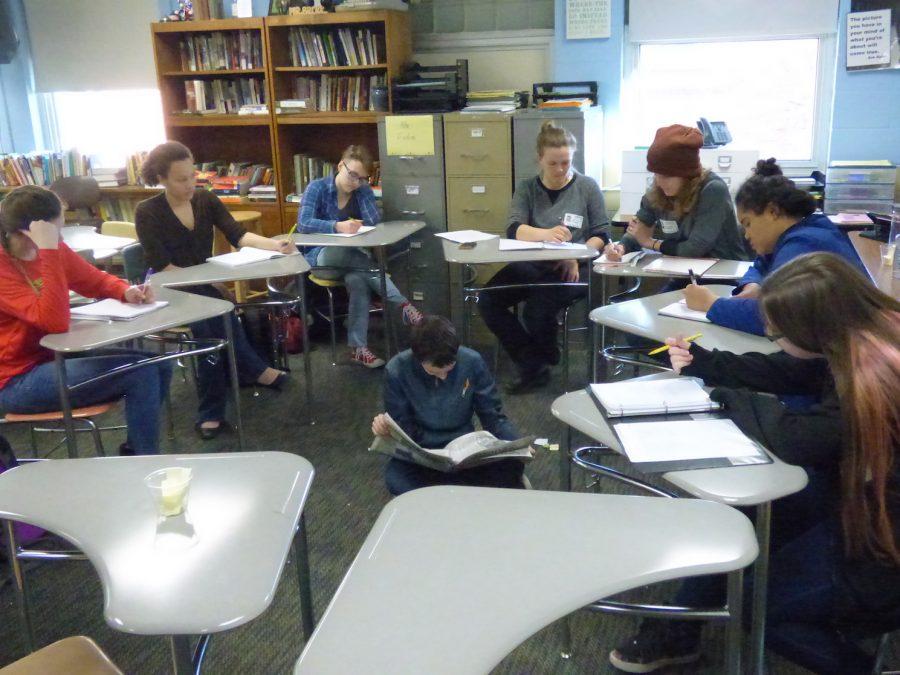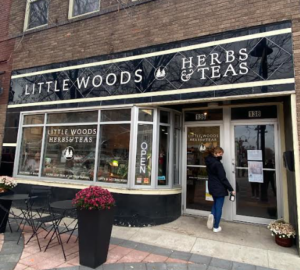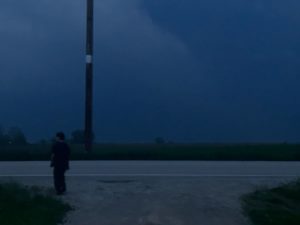News Analysis: LIFE WITHOUT ELECTIVES
February 22, 2017
PART 1: The English electives we had
The vast, gold engraved ceiling of Carnegie Hall stretched far above, the rows of red seats extended far behind, but Ella Bartlett sat at the very front. She was here to receive national honors for her flash fiction piece, “Vertebrae.”
“I always, no matter what, think of that time where I was young, wide-eyed and bushy tailed, sitting in the floor seats, beginning to believe that my words truly matter,” said Bartlett, a 2014 alumna of Ames High and a recipient of the National Scholastic Writing American Voices Award that same year.
“I began writing in third grade, and I’ve always felt the need inside of me to write, but my passion for it has only gone so far because of mentors like Mr. Brekke in the context and freedom of creative writing classes,” Bartlett said. Only the year before another high schooler, Meggie Royer, received a national gold medal for her poetry collection.
“I wrote a little poetry book with a cow on the cover when I was in elementary school, and I would write stories every few days back then, but it was never more than just a hobby until I took Creative Writing at Ames High,” Royer said.
Since Bartlett’s and Royer’s times at Ames High, the creative writing class that helped transform their childhood pursuits into national achievements suddenly came to an end along with other English electives: Advanced Composition, Basic Composition, World Literature, British Literature, Individualized Reading, Introduction to Journalism, Introduction to Theatre, Perspectives in Media, and Discussion and Argumentation. In the wake of these changes, creative students have few school-sponsored outlets for developing their talents and for pursuing their passions, and all students have less flexibility in the English courses they may take.
“As a teacher, [electives] allowed me to craft a curriculum with students in mind that I knew were self-motivated because they had chosen [the course] and it allowed us to move along more quickly and more deeply into that particular subject,” said Joe Brekke, a current English 12 and Advanced English 12 teacher and a former teacher of the creative writing course. Brekke describes that the lack of engagement he sees in students often stems from a lack of choice in classes and in opportunities to pursue their passions. According to him, the electives provided an escape from this lack of engagement.
The electives gave “students an opportunity to be in a community of like-minded people, who had an internal desire to improve at writing, and therefore students had a more vibrant writing community,” Brekke said. He continued, the elective not only gave students class time to write fiction but also an environment for peer review and for receiving constructive criticism: an environment where students who really wanted to, could improve.
The electives also provided a time for teachers to share opportunities for students, such as writing competitions and workshops. It was a school-sponsored time for students to not just become good writers, but also do great things with the pieces they had written.
In addition to academic successes achieved by the students in these electives, English electives served another vital role of building empathy. “Literature and the arts are so important, especially now when our nation is in turmoil, and I think English electives can play a significant role in developing strong and empathic voices, which we really need right now,” Royer said.
Brekke and Bartlett echoed this idea, expressing that Creative Writing taught many skills not learned in other classes. “There are some people in our society who want to put a number on everything and that’s the only way they can ascribe value to it,” Brekke said. “I think there is great value in things you can’t quantify with a number.”
No number can measure a capacity for beauty. No test score can assess the life-changing experience gained from a book or discovered through writing. No grade can be given to the emotional and philosophical gains a student makes. And because no number can measure what the electives provided, no number was missing when these electives were taken away.
PART 2: Why we lost elective courses and where we are now
Junior Riley Taylor sits looking at the blank paper in front of her. She has a timed writing on Wuthering Heights to complete, but her mind is elsewhere, wandering to a story that she would like to write. However, it would be her school writing that would fill that page, not the personal prose that flooded her thinking.
“I almost feel robotic and directionless when I’m stuck in the rhythm of a class that isn’t stimulating,” junior Riley Taylor said. “It makes me worry about what I’m doing with my time—if any of it is really meaningful. Without electives I feel like I’m not challenging myself by trying something new and different.”
With the extreme simplification of the Ames High English department, many students have been left with few choices to express their creative selves in the school setting. The change from a multipathway, elective-based structure to the current three-tiered course progression of general 9th, 10th, 11th and 12th English classes was announced in the fall of 2012 at an English Department meeting of teachers and administrators.
“It was a sad day when we lost the electives,” Principal Spence Evans said. “I loved them. The teachers taught them with passion. The kids enjoyed them. It’s just one of the unfunded mandates that came down from the state.”
According to Evans, new legislation from the state made it imperative that the school discontinue the old structure and replace it with the current simplified version.
“It was necessary to redesign the classes in order to incorporate all of the standards in the Iowa Common Core,” Evans said. This redesign was less a redesign and more a replacement of the electives with a new, standardized approach. According to Evans the electives were not teaching the core standards required by the state, an interpretation that warranted total class replacement.
But other evidence suggests this wasn’t necessary at all.”The Iowa Core was designed to be the basic requirements and should not interfere with other content unless the basics weren’t being addressed,” said Beth Wessel-Kroeschell, Ames’ representative in the Iowa House.
However, most school districts have continued to offer English electives even after the Iowa Core changes. For example, Valley High School in West Des Moines offers over 15 English electives. Johnston High offers 21 English class options with seven electives, and Boone High School offers nine non-standard English options. Every course book consulted shows the same thing: others schools of our size and prestige have considerably more English options for their students. Even a majority of small schools have more English elective options.
“It would be more difficult for districts to ensure the required learning through multiple pathways, but the Iowa Core does not require a district to eliminate electives,” said Rita Martens, administrative consultant for the Bureau of Standards and Curriculum at the Iowa Department of Education. “It does require that all students learn the content specified in Iowa’s academic standards.”
It is strange that an action to completely replace English courses was taken when all that might have been necessary were small changes to the current curriculum. The administration settled with a simple solution and an absolute interpretation of the Iowa Core that simply does not meet the needs of all its students.
A lack of funding can’t be pointed to as a reason for not offering these classes because more teachers aren’t needed if we simply return to the multi-pathway English structure once offered at Ames High. This leaves only the fact that maintaining diversity is difficult as an obstacle.
Other schools have found a way to both comply with the Iowa Core and still offer all the pathways and electives they have always had. Ames High could also do this if diversity and student choice are prioritized over efficiency, simplicity and a desire to create cookie-cutter students who score “proficiently” on standardized tests.
There is a lot of passion diversity at Ames High and our classes should reflect that,” Taylor said.
PART 3: A Proposal
A personal investigation into ISU class opportunities revealed that no creative writing options are available to Ames High students. Therefore, I propose to the Ames High administration that they make a serious and wholehearted attempt to bring back some of the elective courses in English.
Reincorporating the electives into the English curriculum is a doable option even with limited funds. By offering the same number of courses, but providing more pathways, freedom, and choice, Ames High can once more provide the opportunities for creativity and learning that helped Ella Bartlett and Meggie Royer achieve what they did, and that is sorely needed in our school without an increase in spending. As a school that boasts about our diversity and academic success, we are doing a poor job providing students with an equal amount of diversity in classes to further those academic successes. Other school have been successful with this approach, so why can’t Ames High?





























